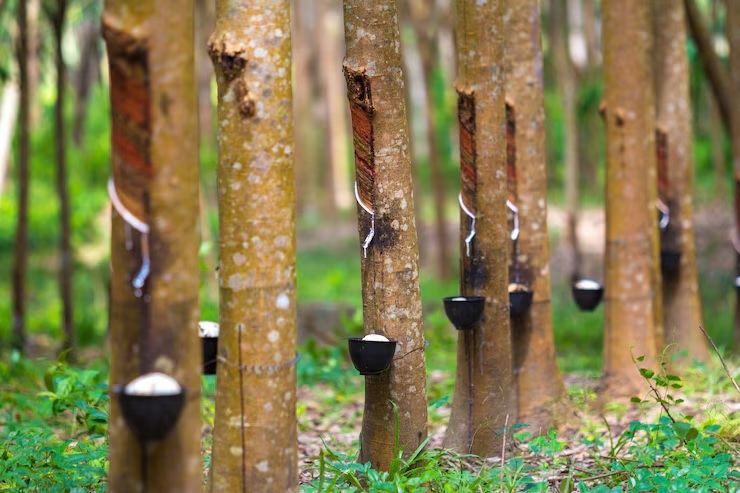Connecting Indonesian exporters with global markets for increased sales and visibility.
our mission is to provide an easy and simple service for the seller and the buyer and to succeed in making them communicate with each other directly without any intermediary party
Indonesian Products
Indonesian products are a true reflection of the country's rich heritage and innovative spirit. From exquisite, handcrafted textiles like batik and ikat to premium spices that awaken global taste buds, Indonesia boasts unmatched diversity. Its agricultural gems, such as world-renowned coffee and palm oil, are staples in international markets. The country also excels in manufacturing high-quality furniture, natural skincare, and eco-friendly goods crafted with precision and sustainability in mind. With a steady supply chain, ethical practices, and competitive pricing, Indonesian products seamlessly meet the needs of global buyers while delivering a touch of authenticity and excellence.
Indonesian Cocoa Powder
Indonesian cocoa is renowned for its quality and versatility, making it a sought-after commodity in global markets. As the world's third-largest cocoa producer, Indonesia contributes significantly to the global cocoa trade, with an annual production of approximately 450,000 metric tons⁽¹⁾. Its cocoa beans are prized for their unique flavor profiles, which are ideal for crafting premium chocolate and cocoa products. Indonesia's competitive pricing is a key advantage, driven by efficient farming practices and a robust supply chain⁽¹⁾. The country exports both raw and semi-processed cocoa products, such as cocoa butter and powder, catering to diverse international demands. Additionally, Indonesia's strategic position in Southeast Asia allows it to access major markets while benefiting from trade agreements and reduced tariffs. Focusing on sustainability and innovation, Indonesia continues to strengthen its position in the global cocoa value chain, offering high-quality products at competitive prices.
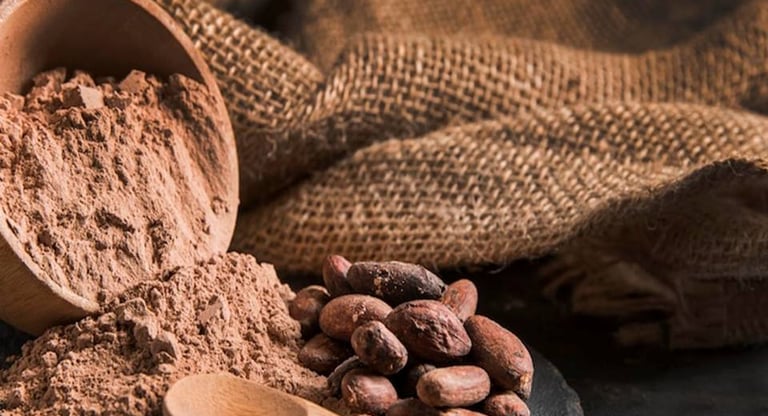

Indonesian Coffee
Indonesian coffee is celebrated worldwide for its rich, distinctive flavors and exceptional quality. Known for varieties like Sumatra Mandheling, Java Arabica, and Toraja, Indonesia's coffee beans offer unique taste profiles, ranging from earthy and bold to smooth and aromatic. These qualities make them a favorite among coffee enthusiasts and specialty roasters globally. As one of the top coffee-producing countries, Indonesia plays a significant role in the global coffee market, contributing a substantial share of exports. Its strategic location and efficient farming practices allow for competitive pricing, making Indonesian coffee accessible to a wide range of buyers. The country's diverse climate and fertile soil enable the cultivation of both Arabica and Robusta beans, catering to varied consumer preferences. Indonesia's commitment to sustainable farming and innovation further enhances its reputation, ensuring consistent quality and supply. Whether you're seeking premium single-origin beans or versatile blends, Indonesian coffee stands out as a reliable and flavorful choice for global markets.
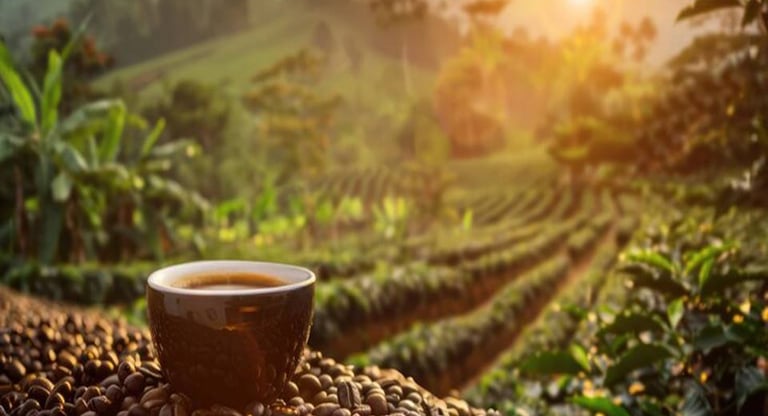

Indonesian Spices
Indonesian spices are a treasure trove of flavor and quality, earning their place as a cornerstone of the global spice trade. Known as the "Spice Islands," Indonesia produces premium spices like nutmeg, cloves, cinnamon, and vanilla, each celebrated for their intense aroma and rich taste. These spices are cultivated using a blend of traditional farming techniques and modern processing methods, ensuring exceptional quality that meets international standards. Indonesia's competitive pricing is a key advantage, driven by its abundant natural resources and efficient production processes. This makes its spices accessible to a wide range of global markets, from gourmet kitchens to large-scale food industries. The country's strategic location further enhances its role in the spice trade, enabling smooth export to major markets like the United States, Europe, and the Middle East. As one of the largest spice producers, Indonesia contributes significantly to global supply, with regions like Maluku and Sumatra leading the way in cultivation. The growing demand for organic and sustainably sourced spices has further boosted Indonesia's prominence, as it continues to innovate and adapt to market trends.
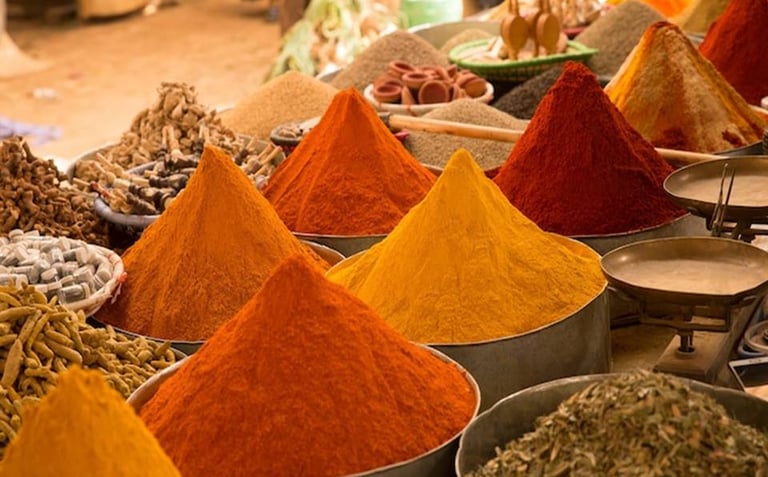

Indonesian Palm Oil
Indonesian palm oil is a global powerhouse, renowned for its exceptional quality and versatility. As the world's largest producer and exporter, Indonesia accounts for over 50% of the global palm oil supply. Its palm oil is prized for its purity and consistency, making it a key ingredient in food products, cosmetics, and biofuels. The industry is a cornerstone of Indonesia's economy, generating billions in export revenue and providing employment to millions. With vast plantations in regions like Sumatra and Kalimantan, Indonesia ensures a steady and sustainable supply. The government actively supports the sector with policies that promote growth and innovation, further solidifying its global dominance. Indonesian palm oil stands out for its competitive pricing, driven by efficient production processes and strategic export channels⁽¹⁾⁽²⁾. As demand for eco-friendly and sustainable products rises, Indonesia continues to adapt, offering palm oil that meets international standards while prioritizing environmental responsibility.
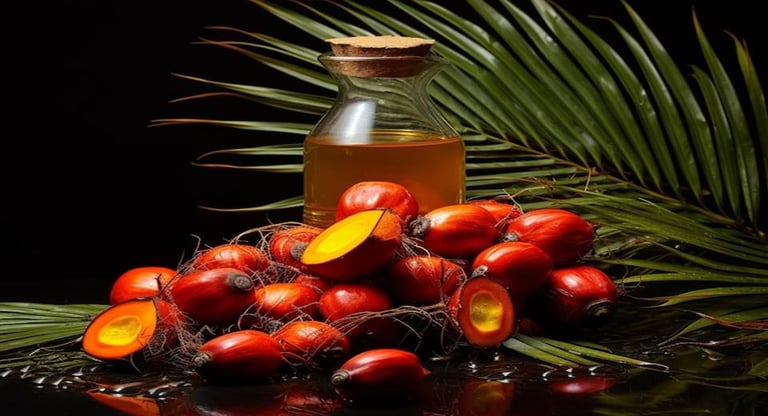

Indonesian Fruits
Indonesia is a paradise of fruit diversity, thanks to its fertile soil and abundant water resources. The tropical climate nurtures a wide variety of fruits, from exotic delights like mangosteen, rambutan, and durian to globally loved staples like bananas, pineapples, and mangoes. Each fruit boasts exceptional quality, rich flavors, and vibrant colors, making them a favorite in both local and international markets. Regions like Sumatra, Java, and Bali are known for their lush plantations, producing fruits that are not only delicious but also packed with nutrients. Indonesia's commitment to sustainable farming ensures that these fruits are grown responsibly, preserving their natural goodness. Whether you're seeking fresh produce or processed fruit products, Indonesia's offerings are a testament to its agricultural richness and biodiversity
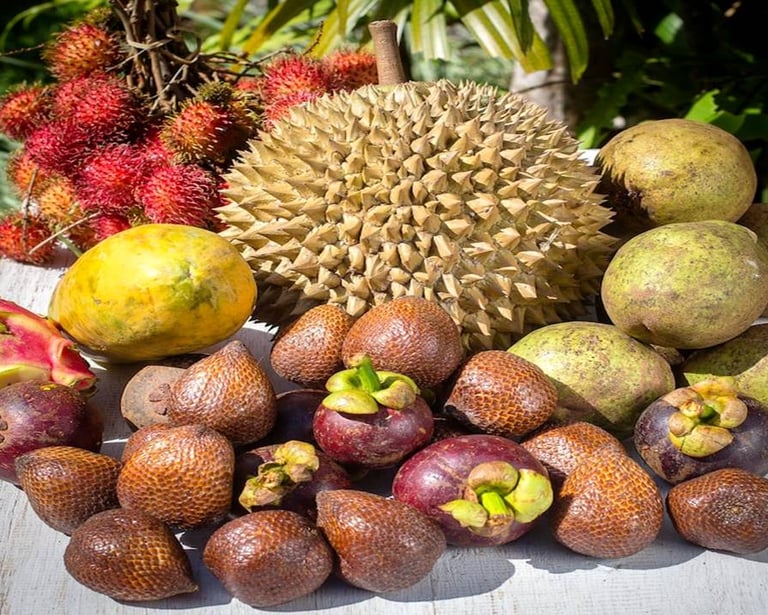

Indonesian Sea Food
Indonesia is a marine treasure trove, boasting one of the most diverse and abundant fish resources in the world. With over 3,000 species of bony fish and more than 850 species of sharks, rays, and chimaeras, its waters are a global hotspot for marine biodiversity. The country's strategic location, surrounded by the Indian and Pacific Oceans, provides ideal conditions for thriving fisheries. Indonesian fish are celebrated for their quality, meeting international standards for freshness and taste. From tuna and snapper to grouper and mackerel, the variety caters to both local and global markets. The fisheries sector is a vital part of Indonesia's economy, employing millions and contributing significantly to export revenues. Efforts are underway to ensure sustainable fishing practices, protecting marine ecosystems while maintaining a steady supply of high-quality seafood. Whether you're seeking premium fish for culinary delights or exploring export opportunities, Indonesia's fish wealth is a testament to its natural abundance and commitment to excellence.
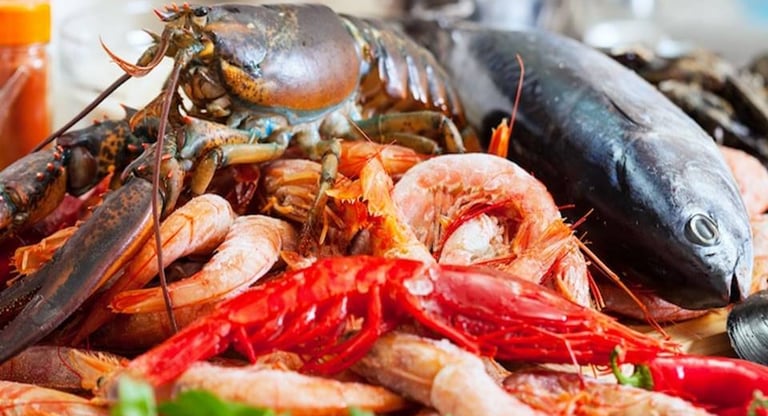

Indonesian Tuna Products
Indonesia's tuna canning industry is a vital player in the global seafood market, known for its high-quality products and sustainable practices. As one of the world's largest tuna exporters, Indonesia processes a variety of tuna species, including skipjack, yellowfin, and bigeye, which are highly sought after for their flavor and nutritional value. The industry benefits from Indonesia's rich marine biodiversity and strategic location, ensuring a steady supply of fresh tuna. Advanced processing facilities and adherence to international standards make Indonesian canned tuna a reliable choice for global consumers. Additionally, the competitive pricing and focus on sustainability enhance its appeal in international markets. With a growing demand for ready-to-eat seafood, Indonesia continues to innovate, offering diverse canned tuna products that cater to various tastes and preferences.


Indonesian Natural Wood Products
Indonesia is renowned for its rich variety of natural wood products, celebrated for their quality, durability, and aesthetic appeal. The country offers a diverse range of woods, including teak, mahogany, rosewood, suar, and acacia, each with unique characteristics suited for furniture, construction, and decorative purposes.Teak wood stands out as the most famous and sought-after natural wood in Indonesia. Known for its golden hue, fine grain, and exceptional strength, teak is highly resistant to weather and pests, making it ideal for both indoor and outdoor furniture. Its natural oils enhance its longevity, ensuring it remains a favorite choice for premium designs worldwide. Other notable woods include mahogany , valued for its smooth texture and rich color, and rosewood , admired for its dark elegance and durability. Indonesia's commitment to sustainable forestry practices ensures that these natural wood products meet global standards while preserving the environment.


Indonesian Car Tiers
Indonesia's car tire industry is a significant player in the global market, driven by its robust automotive sector and abundant natural resources. As one of the world's largest producers of natural rubber, Indonesia has a competitive edge in tire manufacturing, with over 250,000 tons of natural rubber consumed annually by the industry. This ensures a steady supply of high-quality raw materials at competitive prices. The country produces millions of car tires annually, with approximately 70% of the output exported to international markets, including the Middle East, Europe, and the Americas⁽¹⁾⁽²⁾. Indonesian tires are known for their durability and adherence to global quality standards, making them a reliable choice for both original equipment manufacturers (OEMs) and replacement markets. The industry is supported by advanced manufacturing facilities and a growing focus on eco-friendly tire production, such as green tires with low rolling resistance⁽³⁾. With increasing vehicle sales and infrastructure development, the Indonesian tire market is poised for continued growth and innovation.


Indonesian Genuine leather shoes
Indonesia's genuine leather shoe industry is a perfect blend of tradition, craftsmanship, and modern innovation. Known for its skilled artisans and high-quality materials, the industry produces footwear that combines durability, elegance, and comfort. From handcrafted leather boots to sleek formal shoes, Indonesian brands cater to diverse tastes while maintaining global standards. The country's access to premium raw materials, such as cowhide and goatskin, ensures exceptional quality. Local manufacturers emphasize meticulous detailing, creating shoes that are not just functional but also works of art. With competitive pricing and a growing focus on sustainability, Indonesian leather shoes are gaining recognition in international markets. Regions like Bandung and East Java are hubs for this thriving industry, where tradition meets creativity. Whether it's bespoke designs or eco-friendly innovations, Indonesian leather shoes offer a unique blend of style and substance, making them a standout choice for global buyers.


Indonesian Charcoal
Indonesia's charcoal industry is a shining example of innovation and sustainability, fueled by the country's rich natural resources and skilled craftsmanship. As a global leader in charcoal production, Indonesia offers a diverse range of high-quality charcoal types, each tailored to meet specific needs. From Coconut Shell Charcoal, an eco-friendly favorite for shisha and BBQ, to Halaban Charcoal, prized for its high carbon content and consistent heat output, the options are vast. Tamarind Charcoal stands out for its long burn time and low smoke emission, while Mangrove Charcoal is valued for its dense structure and extended burning duration. With a commitment to sustainable practices and competitive pricing, Indonesia's charcoal products are trusted worldwide for their efficiency and versatility. Whether it's for grilling, industrial heating, or environmental applications, Indonesian charcoal continues to light the way in global markets


Indonesian Photocopy Papers
Indonesia's photocopy paper industry is a significant contributor to the global paper market, driven by its abundant natural resources and advanced manufacturing capabilities.
1. Industry Overview:
- Global Presence: Indonesia is one of the world's leading producers and exporters of photocopy paper, supplying high-quality products to markets across Asia, Europe, and the Americas.
- Production Capacity: The industry benefits from a robust infrastructure, with an annual production capacity of millions of tons of paper.
2. Product Quality:
- High Standards: Indonesian photocopy papers are known for their brightness, smooth texture, and durability, making them ideal for high-speed printing and copying.
- Eco-Friendly Options: Many manufacturers focus on sustainable practices, offering recycled and FSC-certified papers to meet global environmental standards.
3. Competitive Advantages:
-Cost-Effective Production: Access to abundant raw materials like pulp and efficient production processes ensure competitive pricing.
- Strategic Location: Indonesia's proximity to major shipping routes facilitates easy export to global markets.
4. Export Markets:
- Top Destinations: Key export markets include the United States, Europe, and neighboring Asian countries.
- Diverse Applications: Indonesian photocopy papers are widely used in offices, schools, and printing industries worldwide.
5. Sustainability Efforts:
- Green Initiatives: The industry is increasingly adopting eco-friendly practices, such as using renewable energy and reducing water consumption during production.


Indonesian Tobacco
Indonesia's tobacco industry is one of the largest and most unique in the world, playing a significant role in the country's economy and culture.
1. Industry Overview:
- Global Standing: Indonesia is the fifth-largest tobacco market globally, with a high smoking prevalence of around 38% as of 2023.
- Economic Contribution: The industry contributes significantly to Indonesia's GDP, generating approximately 148 trillion IDR in 2023 from manufacturing alone.
- Employment: The sector directly employs over 180,000 people and indirectly supports around 10 million workers.
2. Unique Products:
- Kretek Cigarettes: Indonesia is famous for its kretek cigarettes, a blend of tobacco, cloves, and spices. These are a cultural staple and dominate the local market, accounting for about 88% of cigarette consumption⁽³⁾.
- Machine-Made Kretek: This segment holds approximately 75% of the market share, showcasing the industry's modernization⁽²⁾.
3. Market Dynamics:
- Rising Demand: While global tobacco consumption declines, Indonesia's demand continues to grow, driven by affordability and cultural acceptance.
- Youth Market: A significant portion of the market includes younger consumers, influenced by aggressive marketing and low prices.
4. Export Opportunities:
- Production Volume: Indonesia produced around 240,000 metric tons of tobacco in 2023, with both domestic and international markets in focus.
- Global Reach: The country exports raw tobacco and finished products, catering to markets in Asia, Europe, and beyond.
5. Challenges and Regulations:
- Health Concerns: High smoking rates have led to increased health awareness and anti-smoking campaigns.
- Regulatory Environment: The government has implemented measures like age restrictions and advertising regulations to control consumption.
6. Cultural Significance:
- Historical Roots: Kretek cigarettes originated in Java in the late 19th century and remain a symbol of Indonesian heritage.
- Economic Backbone: The industry supports rural economies and small-scale farmers, making it a vital part of the social fabric.
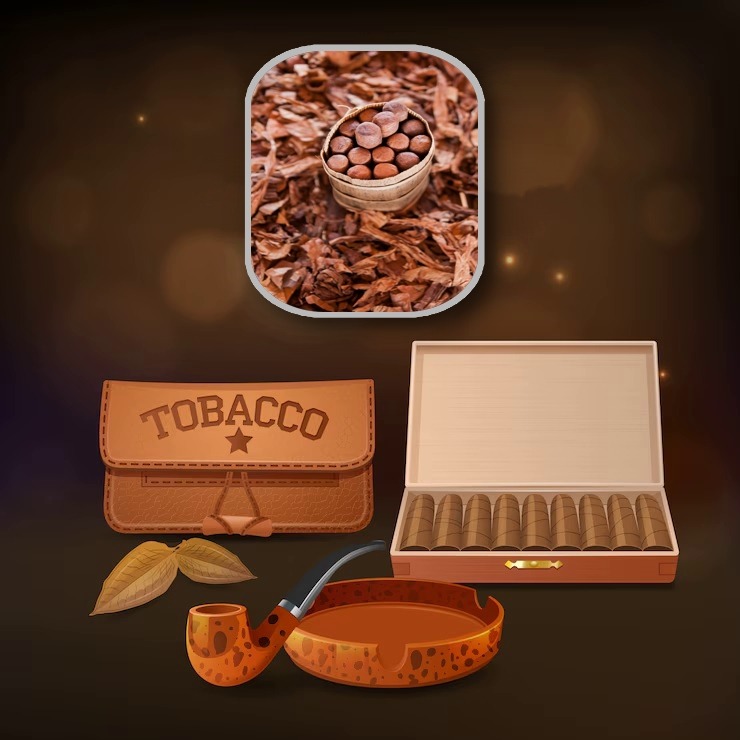



Indonesian Agarwood OUD
Indonesian Agarwood OUD is nature's aromatic masterpiece.
Extracted from the heartwood of Aquilaria trees, it offers a luxurious, deep fragrance cherished worldwide. Known for its rich, woody, and slightly sweet aroma.
Indonesian OUD is a symbol of elegance and spirituality, perfect for perfumes, incense, and rituals. Crafted with care, it embodies Indonesia's heritage and commitment to quality
Indonesian Agarwood OUD is a highly coveted fragrance ingredient, treasured for its deep, woody, and hypnotic aroma. Extracted from the resinous heartwood of Aquilaria trees, it undergoes a meticulous distillation process to achieve its luxurious scent profile—rich, musky, and slightly sweet, often infused with hints of spice and balsamic undertones.
Uses & Global Appeal
High-End Perfumery: A prized essence in luxury perfumes, offering longevity and depth.
Spiritual & Cultural Rituals: Used in incense, meditation, and religious ceremonies for its calming properties.
Traditional Medicine: Known for its therapeutic benefits, including relaxation and stress relief.
Export & Market Potential
Indonesia is a leading producer of Agarwood OUD, supplying global markets with premium-grade extracts. With increasing demand from the Middle East, Europe, and Asia, it holds a strong position in international trade. Sustainable sourcing and ethical cultivation have become essential, ensuring quality while preserving Indonesia’s rich forestry.
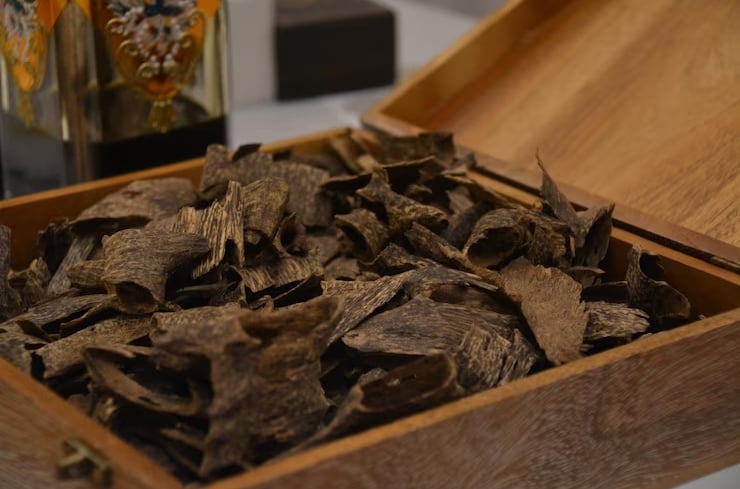

Indonesian Metal & Stone
Indonesia's copper industry is a powerhouse of potential, fueled by rich reserves and advanced mining capabilities. As the world's seventh-largest copper producer, Indonesia contributes approximately 4% of global copper output. With major players like Freeport-McMoRan leading the charge, the industry thrives on innovation and efficiency. Copper exports are a vital part of Indonesia's economy, with Japan being a key destination⁽¹⁾. The country's strategic focus on refining and downstream processing ensures high-quality products that meet international standards. As demand for copper rises in renewable energy and electric vehicles, Indonesia's copper industry is poised for sustainable growth and global impact


Indonesian Chemical products
Indonesia's chemical industry is a vital pillar of its economy, contributing significantly to GDP and exports. The sector encompasses a wide range of products, including fertilizers, petrochemicals, plastics, paints, and pharmaceuticals, supporting industries like agriculture, textiles, and manufacturing.
Key Highlights of the Industry
- Economic Impact: In 2022, the chemical industry accounted for 10.5% of Indonesia’s GDP, with exports valued at $40 billion.
- Major Export Destinations: Indonesia exports chemical products primarily to China, India, Malaysia, the United States, and Japan.
- Growing Market: The industry is expected to grow at an annual rate of 5.5% over the next five years, driven by investments in refining and petrochemical facilities.
Uses of Indonesian Chemical Products
- Agriculture: Fertilizers and pesticides are essential for Indonesia’s thriving agricultural sector.
- Petrochemicals: Used in the production of ethylene, polyethylene, and polypropylene, supporting industries like packaging and automotive.
- Textiles: Chemicals such as caustic soda are crucial for dyeing and fabric processing.
- Pharmaceuticals: Indonesia produces key chemical ingredients for medicines and healthcare products.
With a strong focus on sustainability and industrial expansion, Indonesia aims to position itself as Southeast Asia’s largest petrochemical hub by 2027.
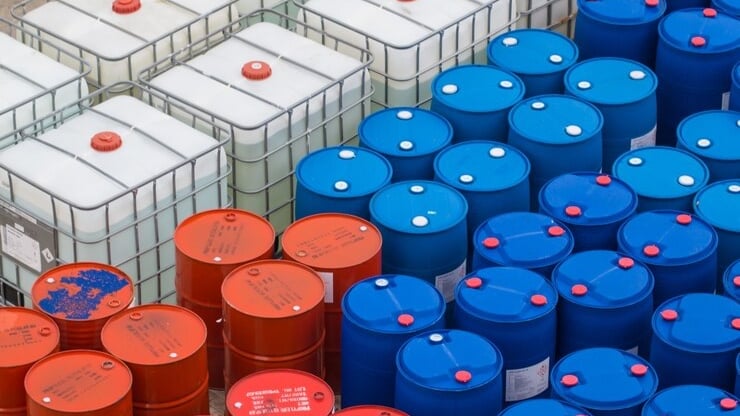

Indonesian Copper
Indonesia's copper industry is a cornerstone of its mining sector, contributing significantly to the global copper market. Here's a concise overview:
1. Industry Overview
- Global Ranking: Indonesia is the world's seventh-largest copper producer, accounting for approximately 4% of global output.
- Major Mines: The Grasberg mine in Central Papua and the Batu Hijau mine in Sumbawa are among the largest copper mines globally, producing the majority of Indonesia's copper.
- Production Volume: In 2023, Indonesia mined 941,000 metric tons of copper.
2. Export Dynamics
- Key Markets: Indonesia exports copper primarily to countries like Japan and China.
- Refining Capacity: While Indonesia has established smelting facilities, much of the refining is concentrated in other countries, such as China.
3. Applications
Copper from Indonesia is widely used in:
- Electrical Wiring: Due to its excellent conductivity.
- Construction: For plumbing and roofing materials.
- Renewable Energy: Essential for electric vehicles and solar panels.
4. Sustainability & Challenges
- Environmental Concerns: Mining activities, particularly at Grasberg, have faced criticism for ecological impacts.
- Downstream Development: Efforts are underway to increase domestic refining and processing to add value to exports


Indonesian Plastic Raw Material
Indonesia's plastic raw material industry is a dynamic and growing sector, fueled by the country's expanding economy and industrial development.
1. Industry Overview
- Production & Export: Indonesia is a significant producer and exporter of plastic raw materials, including polyethylene (PE), polypropylene (PP), and polyvinyl chloride (PVC). These materials are essential for various industries worldwide.
- Export Markets: Key destinations for Indonesian plastic exports include China, Japan, Vietnam, Malaysia, and the United States.
- Economic Contribution: The industry plays a vital role in Indonesia's economy, supporting manufacturing and trade.
2. Uses of Plastic Raw Materials
- Packaging: Widely used in food, beverage, and consumer goods packaging due to their durability and flexibility.
- Construction: Essential for pipes, insulation, and other building materials.
- Automotive: Used in vehicle components like dashboards, bumpers, and interiors.
- Electronics: Integral to the production of casings, cables, and other electronic parts.
3. Sustainability Efforts
- Eco-Friendly Initiatives: The Indonesian government is encouraging the production of biodegradable and recyclable plastics to address environmental concerns.
- Policy Changes: Efforts are underway to phase out single-use plastics by 2029, promoting sustainable alternatives.


Indonesian Rubber
Indonesia’s rubber industry is a powerhouse of resilience and innovation the world’s second-largest producer, Indonesia supplies premium natural rubber to global markets, fueling industries from automotive to healthcare. With vast plantations and sustainable practices, its rubber is prized for durability, elasticity, and versatility. Whether shaping tires, gloves, or industrial goods, Indonesian rubber stands as a vital force in global trade
